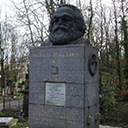For over half a century, Dissent made its home in what was once affectionately called in these pages “the intellectual kibbutz of Manhattan’s Upper West Side.” The neighborhood was synonymous with Jewish intellectual life. It was a small world, perhaps, …

Log in to download the EPUB or MOBI edition.

Thomas Piketty’s Capital in the Twenty-First Century is a weighty book, replete with good information on the flows of income, transfers of wealth, and the distribution of financial resources in some of the world’s wealthiest countries. But it is not a very sound guide to policy. And despite its great ambitions, his book is not the accomplished work of high theory that its title, length, and reception (so far) suggest.

Jonathan Sperber is right to portray Marx as a product of his times. But he goes astray in limiting the application and relevance of Marx’s ideas to the relatively brief time—from 1840 to 1880—in which he wrote. If a thinker discerns deeper trends within the history of his time, he may produce ideas that are relevant well beyond his passing.

David Caute’s thought-provoking, meticulous study tells the story of the conflict between the two dominant ideologies of the last century through the lives of two of their most eloquent adherents, and the deceptions in which each of them allowed himself to engage.

The Another Self Portrait reissue comes as a vindication of the appropriateness of a “great artist” throwing off as much “product” as the market can bear. No longer a cynic for churning out releases, Bob Dylan is widely seen as wise and generous for sharing more.

By some metrics, African-American women are faring better than black men. They comprise nearly two-thirds of black undergraduates and a clear majority of advanced degree holders. But these numbers tell only part of the story.

When the artist Donald Judd bought his loft at 101 Spring Street in the late 1960s, SoHo was beginning to transform from a “blighted” industrial area to a luxury neighborhood. Today, Judd’s loft is a time capsule of SoHo’s transformation, which has become a model for gentrification around the country.

Fast food work has long been synonymous with bad working conditions and crummy pay—but beginning in the fall of 2012, it had also become synonymous with widespread labor unrest.

The rhetoric last summer at commemorations of the fiftieth anniversary of the March on Washington was quite different from that heard at the original march in 1963. Instead of celebrating the great march, the anniversary events sounded a plea for a new civil rights movement. Largely missing from that call, however, was the strong prophetic voice of black religion.

“The owl of Minerva,” Hegel famously wrote, “flies only at dusk”: historical events can be theoretically comprehended only in retrospect. Is this the case with neoliberalism? A term ubiquitous in the academy but scarcely used outside it, the concept is difficult to define with precision. Two recent books attempt to describe neoliberalism’s historical origins and explore its current political implications.

The military conflict inside Syria and the political negotiations between the government, rebels, and their respective allies are often treated as separate issues, with the refugee crisis merely a tragic outcome of the crisis inside the country. But the refugee flight, the experience of displacement, and the long-term solutions to the crisis are likely to redraw the region’s political map.

What intellectual obituaries reveal about our times. “When the attention to intellectual production goes, so too does our ability to understand the equally fraught process of intellectual reception. And what goes missing is the story of intellectual labor as labor and how that labor has been a force in history.”

An early defeat and a year-old victory have put energy and urgency into the effort by American trade unionists to launch what AFL–CIO president Richard Trumka has declared a “new strategic initiative.”

Log in to download the EPUB or MOBI edition.





















